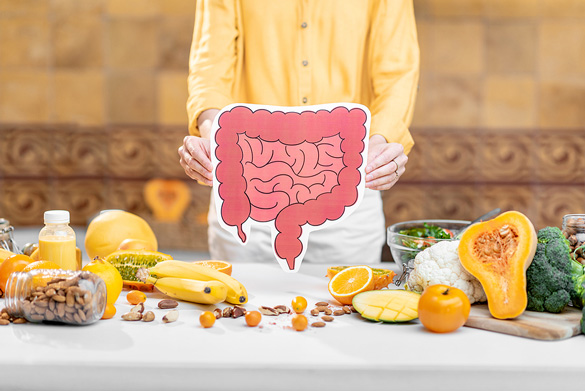“I keep hearing about weight loss resistance. Is that what my problem is? Is that what’s making it impossible for me to lose weight? And if so, what can I do about it?”
Denise’s questions were very familiar. Weight loss resistance is a hot topic among my clients! I hear so many stories from women like Denise, who have made lifestyle changes to the way they eat, sleep, and exercise with great success at first, only to hit a plateau. Their weight loss stalls, and nothing they try gets it moving again.
It’s no wonder so many women get frustrated. Weight loss resistance is a real issue – but there are real solutions! Three things that I often see in women with weight loss resistance are: they’re eating too many calories without realizing it; they’re doing the wrong kind of exercise; or they have metabolic dysfunction at play.
Diet and exercise come up in nearly every discussion about weight loss, but the third issue is something people need to understand better. It’s time to have a conversation about metabolism, how it impacts weight loss efforts, and what can go awry with your metabolism.
A few words about metabolic damage
Before we talk too much about metabolism and weight loss resistance, let’s examine a term you might be hearing more and more these days: metabolic damage.
I think there’s a lot of confusion around this term, and I think it’s important for women to know that when people are talking about metabolic damage, it’s not as dire as it may sound. Most metabolic dysfunction, as I like to call it, can be reversed with some attention to specific details. It’s when this dysfunction goes unaddressed for too long that more serious problems can occur, resulting in much longer healing time – and sometimes permanent disease.
What most people mean when they talk about metabolic damage is the way your body will adapt, physiologically, to prolonged restriction of calorie intake. This is“starvation mode”, where your body believes it’s not going to have enough fuel, so it holds on to anything it can. It’s all about self-preservation. Your body knows what it needs, and if it is consistently not getting enough, natural metabolic adaptivity occurs to avoid starvation. While that’s a good thing in times of true scarcity, it’s very harmful for extended amounts of time.
What causes changes to your metabolism?
There’s simply no easy answer to this question; there are just too many things that can impact metabolism. But there are a few worth mentioning because I encounter them so often when working with women to help them lose weight.
Yo-yo dieting and poor nutrition
First, diet can have a huge impact on your metabolism. So many women try diet after diet, hoping to hit on a “magic” solution to their weight struggles. But this could be making those struggles harder. Constant changes to the way you eat can confuse your body. And if you cut calories too drastically, you’re sending a message to your metabolism to slow down — exactly the opposite of the message you want to send!
Eating too little protein, and other macronutrients, can also create a sluggish metabolism. A well balanced plate would be one-half vegetables, one quarter protein, and one quarter high quality fats and complex carbohydrates.
Too much exercise
When weight loss slows or stops, women often overcompensate by trying to burn more calories, so they increase the amount of exercise they get. But this extra energy expenditure can actually tell your body to put the brakes on burning calories. If you are using significantly more calories than you are eating, you may be sending out a “danger, starvation ahead” signal.
Hormonal shifts
If your hormonal levels are imbalanced, your metabolism could get stuck. I have often seen women with thyroid issues who have very high levels of reverse T3 hormones. I see women with years of poor nutrition behind them, who have developed leptin resistance – and therefore can’t easily tell when they are full. I see adrenal dysfunction, and I see low testosterone (which you need for burning fat and calories). All of these hormonal problems can cause your metabolism to slow drastically. And not understanding how it’s all related can cause hormonal imbalances in the first place!
Metabolic Dysfunction and Weight Loss Resistance
Now you know some things that could cause reduced efficiency in your metabolism – but how is that connected to weight loss? Let’s take a look at how it all unfolds.
When you begin a new weight loss program involving less food and more exercise, your body’s initial reaction is often positive. Energy reserves are activated as your hypothalamus and pituitary glands send out messages to your thyroid gland, adrenal glands, and gonads. These systems work together to help you burn fat and gain muscle. This is the phase when women are thrilled because they’ve dropped a couple of pounds quickly, and they feel energized.
Unfortunately, if you eat too little and exercise too much for too long, the stress on your body quickly turns from positive to negative effects. Your body tries to make up for the lack of calories by sending a very different message to these systems. That’s when you might feel cravings and an overall drop in energy. And, your metabolism may slow to a crawl, thus causing your weight loss to halt.
For some women, this causes a knee-jerk reaction to eat even less, or exercise even more. But that approach will not kick start your weight loss again, and it may cause far more serious issues. You may find yourself exhausted, anxious, depressed, having digestive issues, unable to sleep, and even gaining weight instead of losing. Your immune system is probably in overdrive now, and you may find yourself reacting to foods that have never bothered you before, as well as developing other autoimmune issues.
If you’re at this point, you have to understand that healing will take time. But it is possible to get yourself on the right path again.
Tips to help you “rev up” your sluggish metabolism
Weight loss is such an individual issue. That means that what works for your best friend might have the opposite effect on your body. That’s why it’s important to work with a professional (and possibly do some genetic testing) to see what your approach should be. There are some things, however, that anyone can do to boost metabolism and turn things around. Here are a few healthy habits that can benefit anyone:
Eat enough of the right kinds of foods.
When you are dealing with metabolic dysfunction, you might be tempted to just throw in the towel, reverting to old habits since nothing you try is working anyway. Don’t! Focus on eating whole foods, protein and healthy fats on a regular schedule. You may need to eat more frequently – about every three hours – until you heal. Whatever you do, do NOT just jump on the next fad diet bandwagon. That’s likely how you found yourself in this position in the first place.
Exercise smart
While it may be tempting to ramp up your exercise routine, what you might need is to reduce it instead. Try cutting out intense cardio training and taking long walks instead. Some gentle strength training can also help you get on the right track. Try interval training, which means alternating going your hardest with working at an easier pace within a 20 minute time frame.
Make sleep a priority
Poor sleep can lead to a lot of serious health concerns. There’s a fairly significant body of research that indicates that sleep deprivation, disrupted circadian rhythms, and sleep disorders can cause disruption of metabolism. That’s why it’s so important to be sure you are getting enough high-quality sleep each night. I recommend setting a bedtime for yourself that allows for at least seven full hours of sleep. And be sure to allow enough time to relax and settle before you should actually be asleep!
Heal digestive problems
Gut health is another key to feeling your best, and good gut health allows your metabolism to function to its best ability. The biggest factor in healing digestive issues is replenishing the “good” bacteria – especially if you’ve been overexposed to antibiotics, which wipe out those good bacteria along with the bad ones. Eating probiotic foods can really help – such as kefir, kombucha, and other fermented foods. Fiber and health fats are also great for the good guys.
Reduce stress
For many, this is the top problem. Stress is everywhere, and it’s hard sometimes to find ways to mitigate it. But there is so much research connecting stress with metabolic issues, including heart disease, type 2 diabetes, and high blood pressure, that it’s worth doing what you can. Although stress can cause some people to lose weight, while others gain, there’s little doubt that it has an impact on your overall metabolism. You can minimize this impact by making the time to alleviate both physical and emotional stress. The best way to reduce stress is to set aside time to do something that brings you joy each and every day. This is highly individual, and your first step might be to make the time to really examine what that might be for you.
Reverse metabolic dysfunction to find your best self!
Losing weight is a huge issue for women. I get it – I’ve been there myself. But when you are constantly chasing that “magic solution”, you’re bound to be disappointed – just like Denise was.
She learned more about what was happening in her body, and began to recognize the signs of a dysfunctional metabolism. With the right information, you can do this before the dysfunction progresses too much. When you understand that what you are doing might be hindering your progress, you can turn it around. Before you know it, those numbers will start moving in the direction you want again – and you’ll have the energy and vitality to really enjoy it!
References:
https://www.metaboliceffect.com/metabolic-damage-symptoms/
https://www.verywellfit.com/when-we-cause-metabolic-damage-and-how-to-fix-it-3121341








